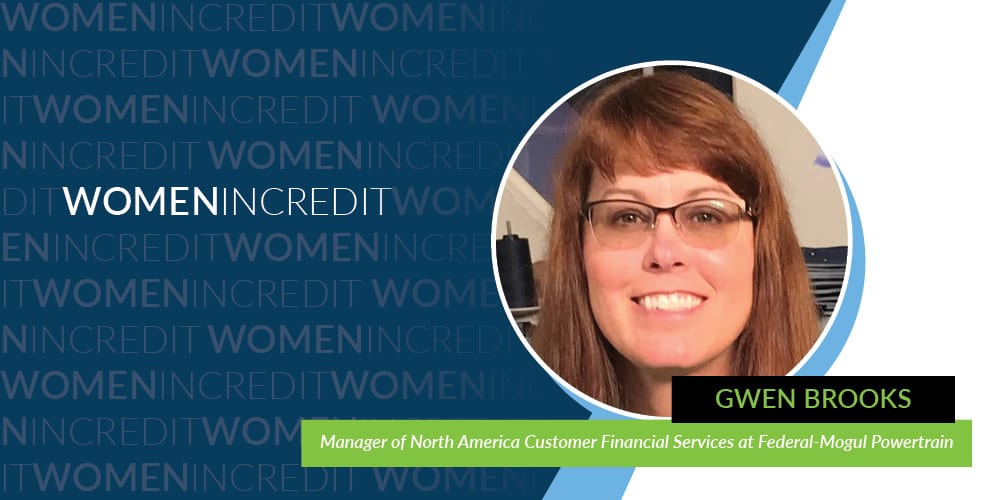Gwen Brooks, Manager of North America Customer Financial Services at Federal-Mogul, the Powertrain division of Tenneco, has maintained a career in the credit and collections field for over thirty years. Gwen has spent most of her career at Federal-Mogul; recently, Dan Pike, Director of Motor Credit at ABC-Amega, sat down with Gwen to discuss her career.
DP: What is your educational background?
GB: I started at Federal-Mogul as a secretary and have an associate’s degree in Administrative Secretarial. After working several years as the secretary to the Credit Manager, it was suggested by one of his direct reports, because the company offered tuition reimbursement, that I should consider getting my bachelor’s degree. I chose the University of Michigan because they have a campus in Dearborn, which is close to home and the office; and I completed my degree while working full-time.
DP: How did you get into the credit and collections industry?
GB: While attending community college for my associate’s degree, I checked out the career center and found that Household Finance Corporation was looking for a part-time Customer Service Representative who would help prepare loan documentation, file, answer telephone calls, and take customer payments. I worked there for just over a year. This experience lead me to my part-time secretarial position at Federal-Mogul in the credit department, and completing my associate’s degree lead to a full-time secretarial position. Eventually, I started performing collections for my own portfolio of customers.
DP: What would you say has been your greatest accomplishment in this industry?
GB: After completing of my bachelor’s degree, I was given responsibility for a small team of collectors managing the automotive retailers. Our focus on these receivables was able to reduce the past dues for this group of customers by over $2 million in a six-month time frame. This was a huge achievement for us as a company at the time. More recently, I would say it is the management of the receivables during the COVID pandemic. Our past dues for my division in North America are the lowest they have ever been, and we have been able to keep them consistently low for the past six months now.
DP: What are the biggest challenges you face as a credit professional in your industry?
GB: This would depend on the day or week you are talking to me, but seriously, it is making sure you understand customer processes. If we do not follow the customer process from order to shipping to billing, these errors end up presenting themselves in the accounts receivable, either causing a delay in the payment or us not receiving full payment of the invoice. The fewer mistakes in this process, the more payments are made without delay.
DP: What are some of the ways that the industry has changed over the years?
GB: The speed at which information is provided and required. When I first started in the industry, we did not even have a fax machine or word processing computer. We worked on dumb terminals connected to the mainframe computer and used typewriters for inter-office communication and letters to our customers. Now we send e-mails requesting information, and we can attach copies of the invoices that are due in that e-mail along with a spreadsheet detailing the balance.
With that speed of information, we are also asked to prepare reports showing our collections progress on a much shorter time frame. We have better access to account details directly from the accounts receivable system, and we have the ability to pull credit reports quickly in order to evaluate a customer’s financial situation.
Even with these changes, some things do not change. However, the delays in payment have the same excuses as they did back when I started—we did not get the invoice copy or we did not receive the parts are still very common responses from customers.
DP: What advice would you give to someone who is thinking about getting into this industry, or currently working in the industry, and looking to grow as a leader?
GB: Corporate credit and collections is a great place to gain an understanding of your company and the order to cash process. You can learn a lot about your company and your customer by understanding these processes. It will help you to be better at your job and help to stop payment issues before they happen. Knowing these processes are very important to your job within the credit area of your company, but it can also help you if you choose to grow into other areas of the company. It is a very good starting point to learn, and if you choose to stay in the credit and collections area, it can be very rewarding.
Something that was shared with me by another Credit Manager is: “do not think of yourself as a collector, think of yourself as a credit professional”. You do more than just collect. You add value to the company with your knowledge of the customer, their processes, the company processes, the ability to review financials, make decisions on credit worthiness, identify customer payment trends, and the like. You are managing the largest asset of the company, their accounts receivable. Anyone can collect, but not everyone is a credit professional.
About Federal-Mogul Powertrain:
Federal-Mogul Powertrain is a leading global supplier of engine components to the world’s manufacturers of vehicles and equipment in the automotive, light, medium and heavy-duty commercial, marine, rail, power generation and industrial markets.
Did you enjoy this interview? Read about other Women In Credit that we have interviewed!
